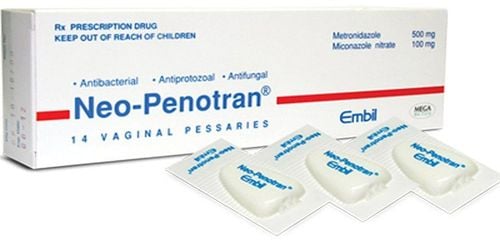The article was advised by Pharmacist Duong Thanh Hai - Clinical Pharmacist - Faculty of Pharmacy - Vinmec Times City International Hospital
Cyclogest 400mg pessary is used to treat premenstrual syndrome as well as many other gynecological diseases. So, to be the most effective when using cyclogest, what should the patient pay attention to?
1. What are the effects of cyclogest 400mg?
Cyclogest 400mg pessary contains progesterone - a natural female hormone. It is used to treat premenstrual syndrome (mood changing, breast tenderness, appetite, fatigue, irritability, depression), to treat postpartum depression, and to use assisted reproductive technology techniques, threatened miscarriage cases. Progesterone is a hormone needed to maintain the normal function of the reproductive organs and its levels naturally change during the menstrual cycle.
After ovulation, if the egg is not fertilized, the level of progesterone in the blood decreases before menstruation begins. Using progesterone for 12-14 days before menstruation helps relieve uncomfortable symptoms of menstruation. However, this mechanism is still not fully understood, because premenstrual syndrome has not been scientifically demonstrated to be caused by a lack of progesterone in the blood.
Progesterone can be used to treat postpartum depression. The placenta produces progesterone throughout pregnancy, and the decrease of progesterone levels after delivery can be one of the causes of postpartum depression.
Progesterone is also used to support early pregnancy in women undergoing in vitro fertilization (IVF). In this case, Cyclogest 400mg pessary was administered on the day of egg harvest. Progesterone acts on the lining of the uterus (endometrium) and causes it to thicken in preparation for the implantation of a fertilized egg. The drug is continued when pregnancy is confirmed until the placenta is fully developed to take over the production of progesterone.
2. How to use Cyclogest?
Cyclogest 400mg pessary is used by inserting it into the vagina or anus. In both conditions, the pill will melt and the progesterone from the pill is absorbed into the general circulation by the blood vessels in these areas. If Cyclogest is used for assisted reproduction, it is given via the vagina.

To treat premenstrual syndrome or postpartum depression, you can choose 1 of 2 ways to put the medication (via vagina or anus) depending on each person's habit. However, if you are using latex condoms or contraceptive caps, you should use the anal way to avoid the drug affecting these protective barriers. Similarly, you should use the anal way if vaginal infections, recurrent urinary tract infections, or recent giving birth. Conversely, if you have inflammatory bowel disease (colitis) or any other problem in controlling bowel movements, a vaginal route should be used.
3. When should you not use Cyclogest?
- Which of the following people should not use Women with abnormal hemorrhage with no known cause.
- Women with a rare inherited blood disorder called porphyria.
- Severe liver disease.
- A progesterone-sensitive tumor is known or suspected, such as breast cancer or cancer of the genital tract.
- Women with venitis caused by blood clots, such as in the legs (deep vein thrombosis) or the lungs (pulmonary embolism), women who have ever had a heart attack or stroke.
Cases requiring caution when using Cyclogest are women at high risk of blood clots in the blood vessels, hypertension, cardiovascular disease, liver/kidney failure, epilepsy, asthma, and migraines. Progesterone is excreted in breast milk, so women who are breastfeeding should not use this medication.
4. What are the side effects of Cyclogest?
The following are some of the side effects known to be associated with Cyclogest (this does not mean that all people using this medication will experience them):
- Common: Drowsiness, abdominal pain or feeling uncomfortable in the digestive tract, breast pain, hot flushes, constipation, and fatigue (when used in assisted reproduction).
- Possible: menstrual disorders, increased mucus from the vagina or anus, vaginal pain, pain at the site of medication, diarrhea, and bloating with the anorectal route.

5. What drugs can Cyclogest interact with?
Some of the following drugs that can affect the effect of progesterone: carbamazepine, fosphenytoin, oxcarbazepine, phenobarbital, phenytoin, primidone, and rifampicin. Tell your doctor if you are taking these medications.
Cyclogest 400mg pessary is used to treat premenstrual syndrome as well as many other gynecological diseases. To ensure effective treatment, patients need to take prescription drugs. In case of abnormality, the patient needs to go to medical centers for examination and treatment.
To arrange an appointment, please call HOTLINE or make your reservation directly HERE. You may also download the MyVinmec app to schedule appointments faster and manage your reservations more conveniently.














